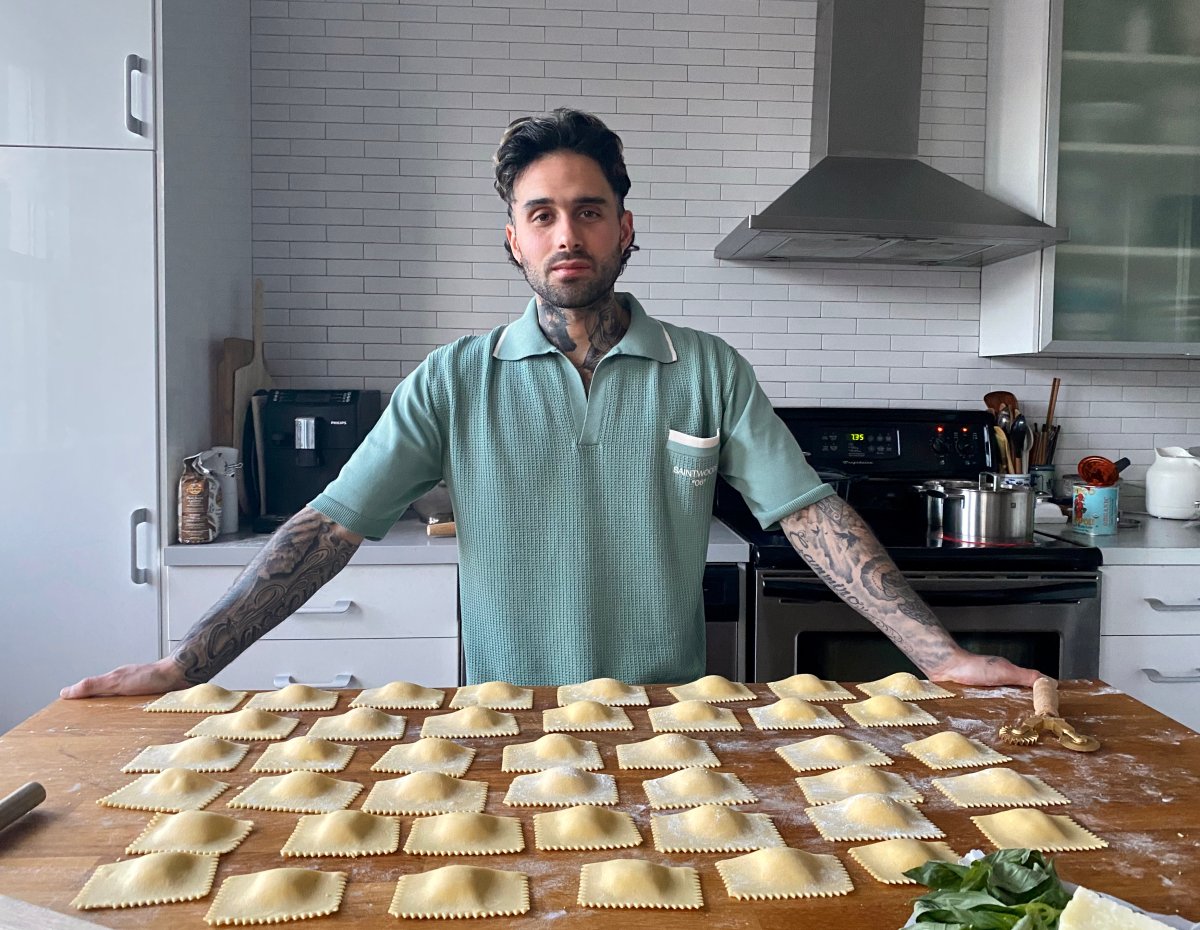Montreal foodie Luca Labelle Vinci had a longtime passion for making homemade pasta, but because of the pandemic, he now earns a living off of it.

When the lockdowns began last March and businesses closed, he was living in an apartment in the Plateau with his childhood friend Victor-Alex Petrenko. Both Vinci and Petrenko worked in bars, so they were suddenly at home and out of work, like many.
“When COVID happened, Vic and I thought it would be a neat idea to make fresh pasta and give it out to our friends,” Vinci said. “Restaurants were closed and I think people quickly got sick of ordering Uber Eats.”
The pair, both in their late 20s, started posting photos of the pasta making process on Instagram and taking orders on the platform.

They racked up a following of hungry locals who started buying or trading other goods, like tattoos or haircuts, for a bag of pasta or tray of lasagna.
“He makes the pasta and stays cute,” said Petrenko, who manages their endeavour. “I do everything else.”
Montreal entrepreneur and friend of theirs Zach Macklovitch offered them a pop-up event last summer at one of his several businesses on the Main, SuWu, where the two men served dishes of their handmade ravioli.
“He trusted us, and we sold out. We ran the whole thing with no experience,” Petrenko said.
The team at Barbara, a new Saint-Henri restaurant made up of Catherine Draws and chef David Pellizzari, eventually took notice.
“Our social media guy saw Luca off Instagram,” Draws said about hiring Vinci. He now works as an apprentice under Pellizzari, and still makes and sells his own homemade goods on his own time with the help of Petrenko.
“The first time I made pasta was with my mom, we made classic ravioli with spinach and ricotta and the most basic tomato sauce,” Vinci said. “It amazed me how something so simple could be so good.”
Vinci says growing up, and to this day, he’s “the biggest mamma’s boy.” His mother was born in Quebec, but her parents are from Sardinia, Italy.
His grandmother was from Montresta, a small village neighboring the city of Alghero and his grandfather was from a town further south, Macomer.
They immigrated to Quebec like hundreds of thousands of Italians did after the Second World War and settled in Quebec City, where Vinci was born to his Italian mother and Indigenous father from the Huron Wendat Nation.

“I was raised by women. They run my family,” Vinci said. His mother ran a hair salon out of his grandmother’s basement. It’s there that he learned Italian, recited prayers at the end of the bed every night, and was “always running around Nonna’s kitchen.”
Vinci says as a kid he was ashamed of his Indigenous heritage, scared of being mocked and bullied. He only developed an interest and appreciation for his Indigenous roots later.
“It took me a lot of time to learn how rich both cultures are, coming from Quebec City,” which is made up of under 1.4 per cent Indigenous people.
READ MORE: Montreal restaurants struggling to survive in COVID-19 era
He says his father always made an effort to expose him to his native culture. He even lived with him for two years as a child on the reserve.
“He still brings me wild moose meat sometimes,” which Vinci has turned into pasta ragu. He says being Indigenous to him means respecting everything — people, nature and earth.
He says he only discovered his love for making pasta when his mother forced him into the kitchen with her. “We used Robin Hood flour, cheap tomatoes, and did the job.”
His friends would come over and love the food, which is when he says he started to feel that he wanted to share that with more people.
Before moving to Montreal in 2017, Vinci worked as a bartender at a restaurant in Quebec City. “I opened my big mouth and told my bosses at the bar that I was making homemade ravioli at home, and just like that, I was supplying a whole restaurant.”
He was working full time at the bar, getting home exhausted at 5 a.m., would wake up at 11 a.m. to spend hours making ravioli to bring back to work with him later that evening.
It was then that he began thinking of really pursuing it.
“It’s an act of meditation. It’s craftsmanship,” Vinci said. “I love seeing people’s reaction when they eat what I made. It makes me feel connected to my roots and my family. It also makes me call my mother and my aunt much more than I otherwise would, because I’m always asking them for recipes and tips.”
Vinci also gets help from his chef friends Francis Blais and Camilo Lapointe Nascimento from Menu Extra, who lend him kitchen equipment and “are always there to mentor and answer questions.”
He credits Petrenko for broadening his culinary view when he first moved to Montreal four years ago. “He knows the city and showed me, like he shows everyone, his favourite places to grocery shop and eat.”
“We get our cheese at Paradis du Fromage at the Atwater market — best ricotta — our produce at the Jean-Talon market,” said Petrenko, “and our meat at Aliments Viens — best meats, eggs, cheeses, hospitality and they also have the most amazing sandwiches — and Boucherie Vito, both in the Mile End.”
“But don’t make the mistake like I did of going into Vito with a Lazio cap,” Vinci said.
- Life in the forest: How Stanley Park’s longest resident survived a changing landscape
- Bird flu risk to humans an ‘enormous concern,’ WHO says. Here’s what to know
- Mental health support still lacking 4 years after mass shooting: Nova Scotia mayor
- Buzz kill? Gen Z less interested in coffee than older Canadians, survey shows
















Comments